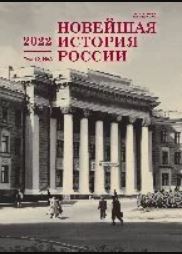Кинотеатры Ленинграда военного времени: в период и после блокады
Wartime Leningrad Cinemas: During and After the Blockade
Author(s): Evgeny V. Volkov, M. V. SapronovSubject(s): Cultural history, WW II and following years (1940 - 1949), Film / Cinema / Cinematography
Published by: Издательство Исторического факультета СПбГУ
Keywords: film network; cinema; Leningrad; Great Patriotic War; social space; blockade;
Summary/Abstract: This article considers cinemas in Leningrad during the Great Patriotic War was a social space, which, using concept of the French sociologist Henri Lefebvre, can be considered as having three levels. First, there is a “representation of space”, that implies these aspects: how cinemas were represented and embodied in material forms (architectural appearance and interior decoration), and how the work of this institution was planned. The second level is “spatial practices”: the functioning of the cinema in real conditions through the activities of its employees, which could differ from orders from above. The third level is the “space of representations”, or how the cinema appears to viewers who visited it. During the Great Patriotic War, the social space of architectural structures in Leningrad cinemas largely remained the same as in the pre-war period. However, in wartime, mobilization acquired a larger character in cinemas. The spatial practices of cinema employees, whose composition has undergone changes in connection with the mass conscription to the front, labor mobilizations, diseases, and high mortality (mostly elderly and disabled people worked there) were also been transformed. The working day for cinema workers increased significantly. At the same time, a number of cinemas in Leningrad were temporarily closed and “conserved”. Cinemas as “spaces of representation” were associated for many viewers with a place of cultural practices, recreation, and distraction from the scourge of war. The repertoire of cinemas in Leningrad in contrast to the pre-war period, has changed significantly in the direction of increasing the display of newsreels, educational and documentary films, as well as military-historical feature films and “allied films” of American and British production.
Journal: Новейшая история России
- Issue Year: 12/2022
- Issue No: 40
- Page Range: 581-595
- Page Count: 15
- Language: Russian

